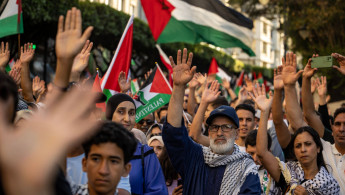In fear of keffiyeh and pro-Palestine protests, Moroccan universities avoid graduation ceremonies
In Morocco, the dean of one of the country's largest universities refused to award a top student her honorary degree during a ceremony because she wore a keffiyeh.
The incident occurred over the weekend at the Higher School of Technology, part of Hassan II University in Casablanca, at an awards ceremony for top students.
When called to the stage, the dean of the Faculty of Sciences in Ben M'Sik, also part of Hassan II University, first tried to persuade the student to remove the keffiyeh, which he deemed a 'political statement' inappropriate for a graduation ceremony, reported attendees. Facing the student's refusal and the audience's boos, the dean, a guest of honour, left the stage shaking his head in disapproval.
"The dean's actions represent irresponsible behaviour within an academic space where freedom of expression should prevail," wrote the Union for Higher Education and Scientific Research at Casablanca's Higher School of Technology in a statement.
The New Arab reached out to the dean for clarification, but no one was available to respond.
A video of the incident went viral on social media, setting off a broader conversation about academic normalisation with Israel in the North African state, despite opposition from students and activists.
This latest 'keffiyeh incident' comes at a time as several Moroccan universities and schools cancelled their graduation ceremonies to avoid 'politically charged' events.
Arabic literature students at the Faculty of Arts and Humanities in Rabat, affiliated with University Mohammed V, said they were barred from having a graduation ceremony due to their solidarity with Palestine. The administration has yet to comment.
The Faculty of Governance at Mohammed VI Polytechnic University (UM6P) also cancelled its graduation ceremony on 11 July, less than 48 hours before the scheduled date.
UM6P’s student union for Palestine said the event was most likely cancelled because they were planning to showcase solidarity by wearing keffiyehs during their valedictorian speeches.
"These circumstances raise questions about the connection between the planned actions and the cancellation of the ceremony," wrote the union on 12 July.
Since Morocco's 2020 normalisation agreement with Israel, UM6P has inked deals with eight Israeli universities, including the Hebrew University of Jerusalem (HUJ), known for its collaboration with the Israel Defence Forces in military technology development.
Last month, the student group, formed in response to Israel's war on Gaza, told TNA that the administration has adamantly rejected severing ties with Israeli counterparts during a negotiation meeting with the union.
UM6P's administration also cancelled a two-day event for alumni on short notice at the end of June. The anti-normalisation student union suspects that the cancellation is related to the alumni’s plan to show solidarity with Palestine during the event.
The keffiyeh, a symbol of Palestinian solidarity, has become a must-wear attire at graduation ceremonies worldwide as students bravely challenge their governments' and schools' ties with Israel amid its ongoing genocide in Gaza.
In Morocco, universities such as Tetouan's Abdelmalek Saadi, Rabat's International University, and Fez's Euro-Mediterranean University maintain agreements and exchange programmes with Israel. Rabat has also confirmed its ongoing normalisation with Tel Aviv, despite public opposition.
Since 7 October, there has been growing discontent against academic normalisation in Moroccan universities. However, this opposition has largely been limited to petitions and timid sit-ins.
"Unfortunately, Moroccan officials are accomplices in normalising normalisation in the country amid the bloody war in Gaza [...] We are back at the demonisation of Palestinian symbols," said Ahmed Weihman, a member of the Moroccan group against Normalisation.
"We also have sources claiming that Morocco is set to host a new Israeli diplomatic delegation in the Israeli office in Rabat [...] That will be shameful," added the activist. The Israeli delegation left Rabat last October for security reasons, and the liaison office was closed temporarily.




 Follow the Middle East's top stories in English at The New Arab on Google News
Follow the Middle East's top stories in English at The New Arab on Google News

![A group of Palestinians, foreign and Israeli activists gather to participated in an olive picking event on the land in the town of Battir, which is under threat of confiscation by Israel in Bethlehem, occupied West Bank on 8 November 2024. [Getty]](/sites/default/files/styles/image_330x185/public/2182930803.jpeg?h=199d8c1f&itok=__0LgGsa)
